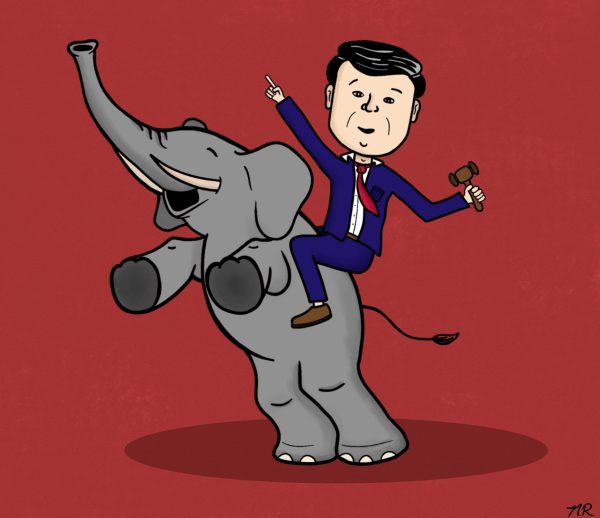
On Oct. 14, Republican Jeff Landry was elected as governor of Louisiana. His history as Louisiana’s attorney general and policy goals demonstrate his racist and anti-Democratic views that will poorly serve the state of Louisiana over the next four years.
His time as attorney general was rife with scandal. Early in 2023, the Louisiana House of Representatives passed a bill that would have made juvenile offenders’ criminal records public before they were tried or found guilty. This proposal was dangerous enough given that these records may follow people into adulthood, but the supporters of the measure included an additional punitive provision.
The Louisiana House ensured the bill applied only to East Baton Rouge, Orleans and Caddo parishes, all of which have majority Black populations. This law clearly burdens Black Louisianans with the possibility of public records for charges they have not been convicted of.
Landry defended this legislation by arguing that people “called this legislation ‘racist,’ yet failed to mention it was supported by both Democrats and Republicans.”
There are two ways to interpret this defense: Landry may have been implying that the law is racist, but it’s bipartisan. Additionally, he could have been suggesting that the simple presence of Democratic Party support somehow makes a law not racist, also a patently absurd notion.
An examination of America’s most racist laws finds bipartisan support: the Fugitive Slave Act of 1850 and the Chinese Exclusion Act of 1882 were both supported by multiple parties. Even as recently as 1994, the Violent Crime Control and Law Enforcement Act was passed with bipartisan support and has led to racially disparate mass incarceration.
He continued by calling Black Lives Matter and other nonviolent civil rights demonstrators “armed thugs.”
Landry has also praised the use of the “stop and frisk,” a police procedure that was declared unlawful because of its violations of constitutional rights. His 2017 WDSU interview is most clear about his repugnant position on the matter. Landry said it is a “vital tool” of law enforcement. He said, “I’m willing, as a law enforcement officer, to understand that there are limitations” to civil rights.
In Louisiana, for more than 100 years, someone could be convicted of a crime with just nine of 12 votes on a jury. That law imprisoned tens of thousands of Black people and was formed with racist intent to limit the impact of Black people on juries, according to the Marshall Project.
Democratic Sen. J.P. Morrell’s statewide referendum on the jury system was approved by the Louisiana Legislature following The Advocate’s series of stories that won a Pulitzer Prize. The racist practice came to an end in 2017. According to Slate’s Dillon Lowe, “Landry’s argument, according to his chief deputy, Wilbur Stiles III, is that the amendment would result in a higher frequency of hung juries, rendering Louisiana’s criminal justice system much less efficient.”
It seems preferable to have a less efficient criminal justice system that is more accurate in convicting guilty people than an efficient conveyor belt which tramples on the constitutional rights of Louisiana residents.
Section 2 of the Voting Rights Act of 1965 outlawed the practice of racial gerrymandering, in which districts are drawn to suppress the voting power of a racial group. Louisiana’s 32.8% Black population would dictate two of the state’s six congressional districts as majority-Black.
Louisiana’s Republican-controlled legislature, meanwhile, only included one district with a majority of Black people during the most recent round of redistricting following the 2020 census.
Despite the racially oppressive result, then-Attorney General Landry argued that this conduct was not racist. The Fifth Circuit Court of Appeals was compelled to order Louisiana to create a second majority-Black district.
Landry does not support a fundamental principle of democracy: the peaceful transfers of power that acknowledge when “your side” loses an election. In 2020, Texas Attorney General Ken Paxton filed a lawsuit alleging voter fraud in four key states Joe Biden won. There has not been any credible evidence discovered of widespread voting fraud in the 2020 election.
Landry was one of the attorney generals that signed an amicus brief supporting this lawsuit that sought to overturn the 2020 election through Supreme Court intervention.
After the Supreme Court dismissed any cases alleging election fraud, several state attorney generals wrote a letter in January 2021 condemning the Jan. 6 insurrection. Still, Landry didn’t sign the letter. Rather, he chose to write a letter of his own, saying that “some violence is acceptable,” according to the Louisiana Illuminator.
Jeff Landry could have tried to win the votes of those unlikely to vote for him — the poorest members of Louisiana and racial minorities. He could have used his capacity as the highest law enforcement officer in the state to make positive change. Instead, he called largely peaceful protestors thugs. He singled out the parishes that contain the most Black people by allowing unproven criminal allegations to be public.
He tried to deny their right to be heard fairly and supported the effort to install someone who lost a presidential election. If Gov. Landry is anything like Attorney General Landry, then his next four years will be a stain on the state of Louisiana.




Leave a Comment